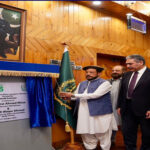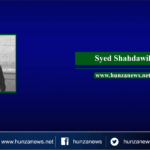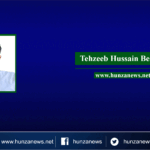A majority in Gilgit-Baltistan, especially the youth, plans to vote for Pakistan Tehreek-e-Insaf (PTI) in the upcoming elections for the Gilgit-Baltistan Legislative Assembly (GBLA), according to a survey conducted by Mountain TV and Mountain Youth Resource & Social Welfare Organization (MYRO).
The survey results, which were revealed on Tuesday, shows that even though majority want to vote for PTI, but they see Pakistan Muslim League (N) as the party set to form the next government in GB.
A majority, 41 percent, of the respondents said they plan to vote for PTI in the 2015 GBLA elections followed by 22 percent for PML (N). This apparently indicates the rise and popularity of PTI in the region, especially among young men and women because majority participants were youth in the age bracket of 21 to 36 years. The survey also found that 16 percent respondents plan to vote for former president Pervaiz Musharraf’s All Pakistan Muslim League (APML) and 11 intend to vote for Pakistan People’s Party (PPP).
It is interesting to note that a majority respondents, 26 percent, see Hafiz Hafeez ur Rehman as the next Chief Minister of GB while 23 percent see Ghazanfar Ali Khan as the next CM of GB. Twenty eight percent respondents named a number of other candidates as prospective CM.
The figures indicate that majority respondents might be planning to vote for PTI, but are apparently thinking that PML (N) will win the elections. Since PML (N) has government in the center, these responses also probably indicate that the survey participants doubt the federal government’s pledge to hold free and fair elections in GB. This also indicates trust deficit between the government in Islamabad and people of GB and may be reflective of the strongly held notion by the people of the region that the party in power in the federation installs its own government in GB.
Thirty nine percent participants said they voted for PPP in the previous elections while 19 percent voted for PML (N). This endorses the official vote results of the last elections whereby PPP won the polls and made government in GB. It is interesting to note that only 14 percent respondents voted for PTI in the last elections whereas the vote trends for the upcoming elections show 41 percent in favor of PTI. This indicates a radical change on the political arena of GB. These findings apparently indicate that the last elections’ PPP voters have switched allegiance and plan to vote for PTI this time around.
The study was grounded in quantitative research design whereby a carefully crafted questionnaire containing 18 closed-ended questions was administered to a sample size of 400 individuals. Simple random sampling method was adopted to select the survey respondents. Even though people of all ages participated in the survey, yet a majority of them turned out to be young men and women.
The survey was conducted in Gilgit because people from all districts are concentrated there; however, the results are reflective of the thoughts, perceptions and intentions of a majority of the respondents from the districts of Gilgit, Hunza-Nagar, Ghizar and Skardu. Effort was made to include people from all districts of Gilgit-Baltistan in the survey. It is noteworthy that 44 percent of the survey participants were women.
The questionnaire was made up of a majority of questions about the former PPP led government’s performances in GB, their governance and handling of the region’s major issues. Questions directed to know people’s plan for the 2015 general elections in GB were also asked.
The overall findings of this survey suggest that young people were not satisfied with the performance of the former GB government and saw it as marred by corruption. It was also found that the youth specifically wants to see a completely new government in GB as a result of the 2015 elections.
Questions about identity, constitutional rights and status, and power of GB government were also asked from the respondents. Majority of the respondents think that the GB government is powerless under any political party and the region is treated unfairly when it comes to constitutional status and rights, and want GB to be treated at par with other provinces with equal rights and representation.
Detailed report of the survey can be downloaded here: Performance of former GB government and future political prospects























